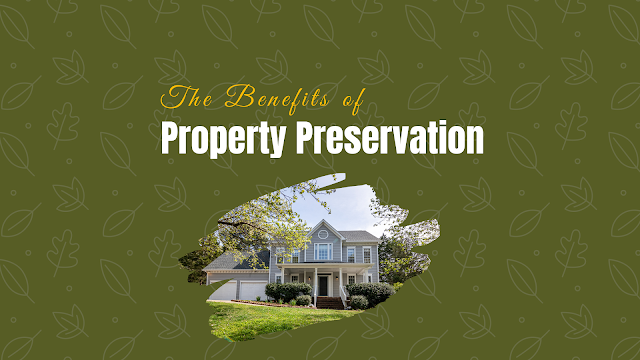Property preservation is important because it helps to protect the value of the property, reduce liability, keep the property safe, comply with local regulations, preserve neighborhood aesthetics, and prevent further damage. By maintaining the property in good condition, property owners can protect their investment and ensure that the property is a valuable asset for years to come.
The Benefits of Property Preservation
Property preservation provides a number of benefits. It aids in property maintenance and so expands the pool of potential purchasers.
Property preservation is important for several reasons. Here are some of the key reasons why property preservation is essential:
- Protects Property Value: Property preservation helps to protect the value of the property by maintaining it in good condition. This is especially important for lenders who own foreclosed or abandoned properties. When a property is well-maintained, it is more likely to retain its value and be sold or rented out at a later time.
- Reduces Liability: Property preservation can help to reduce liability for lenders or property owners. If a property is not maintained and someone is injured on the property, the owner may be held liable for damages. By maintaining the property, property owners can reduce the risk of liability and protect themselves from costly lawsuits.
- Keeps the Property Safe: Property preservation helps to keep the property safe for anyone who enters it. This includes contractors who perform maintenance work, real estate agents who show the property, and potential buyers or renters. When a property is well-maintained, it is less likely to pose a safety hazard.
- Complies with Local Regulations: Property preservation helps to ensure that the property complies with local regulations. This includes regulations related to health and safety, as well as zoning and building codes. By complying with local regulations, property owners can avoid fines and penalties and protect themselves from legal action.
- Preserves Neighborhood Aesthetics: Property preservation can help to preserve the aesthetics of the surrounding neighborhood. When a property is abandoned or poorly maintained, it can become an eyesore and negatively impact the appearance of the neighborhood. By maintaining the property, property owners can help to preserve the aesthetics of the surrounding area.
- Prevents Further Damage: Property preservation can help to prevent further damage to the property. For example, if a property is not properly winterized, it can be damaged by freezing temperatures. By winterizing the property, property owners can prevent further damage and protect the property from costly repairs.
- Keep The Property Clean: Cleaning is an important part of home maintenance. Property Preservation Companies like MCS, Safeguard, MSI or any others will assist you in getting rid of garbage and debris
- Secure The Property: Changing locks, locking doors and windows, constructing a pool fence, a rear fence, and other gates will all contribute to a property's safety. It will keep robbers and vagrants out of an unoccupied residence.
- Boost Curb Appeal: Property preservation will significantly improve your home's curb appeal. Prospective purchasers will be attracted by the interior and exterior upkeep.
- Protect From Winter Issues: Winterizing your home helps protect it from winter harm. Specifically, freezing damage, plumbing difficulties, pipe bursts, blockages, and so on. It is critical in cold climates.
- Get Ready for Market: Your home is now ready to be put on the market after property preservation. Real estate brokers might profit from the sale of the home. If you want to sell your home quickly, choose a contractor from MCS, Safeguard, MSI, or any other company you trust.
Property preservation costs?
Property preservation costs vary depending on the firm offering the service and the concerns that must be addressed. Additional fees may be incurred in order to maintain properties that have been unoccupied as a result of a sale or foreclosure.
PEMCO Limited has grown in the real estate business, becoming a forerunner in the asset management and property services industries. You may take a help from them.
Some of the common expenses associated with property preservation include:
Inspection Fees
Before starting any property preservation work, an initial inspection is typically required to assess the property's condition and identify any necessary repairs. Inspection fees can range from a few hundred to several thousand dollars, depending on the size and complexity of the property.
Maintenance and Repair Costs
Property preservation typically involves a range of maintenance and repair tasks, such as lawn care, cleaning, painting, and HVAC system maintenance. The cost of these tasks can vary widely depending on the property's size and condition, as well as the scope of work required.
Security Costs
Property preservation may also involve security measures to prevent theft or vandalism. This can include installing security cameras, alarms, and fencing. Security costs can add up quickly, particularly for larger properties.
Legal Fees
In some cases, property preservation may involve legal proceedings, such as eviction or foreclosure. Legal fees can be significant, particularly if the property owner needs to hire an attorney.
Insurance Costs
Property preservation may require insurance coverage, such as liability insurance or property insurance. The cost of insurance can vary depending on the coverage needed and the property's location and condition.
Overall, the cost of property preservation can be significant, particularly for properties that require extensive repairs or maintenance. However, investing in property preservation can help to protect the property's value, reduce liability, and ensure compliance with local regulations, making it a worthwhile investment for property owners and lenders.
Property preservation is vital because it protects the property's value, reduces liability, keeps the property safe, complies with local requirements, preserves neighborhood aesthetics, and prevents additional damage. Property owners may protect their investment and guarantee that the property remains a valued asset for years to come by keeping it in good condition.





